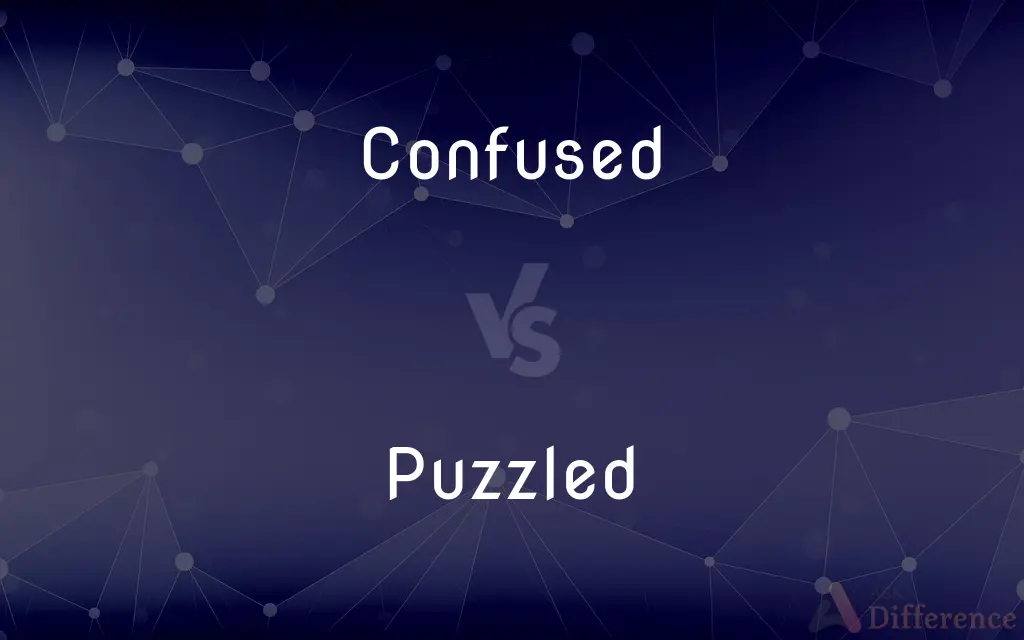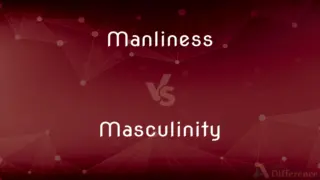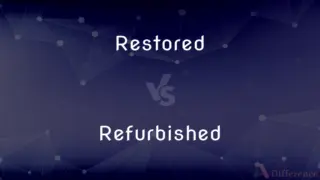Confused vs. Puzzled — What's the Difference?
By Tayyaba Rehman & Urooj Arif — Updated on April 25, 2024
Confused implies a lack of clarity and understanding, often causing distress or difficulty, while puzzled denotes a state of being perplexed or thoughtful over a problem but without the distress.

Difference Between Confused and Puzzled
Table of Contents
ADVERTISEMENT
Key Differences
Being confused often involves a mix-up or inability to distinguish between different items or concepts, leading to feelings of frustration or overwhelm. On the other hand, being puzzled typically suggests a specific problem or question that one is trying to solve, implying a more focused and less emotional state of mind.
Confusion can result from receiving too much information at once or encountering conflicting data, which disrupts one's ability to process information effectively. Puzzlement, however, arises from an intriguing or challenging situation that demands a solution, often sparking curiosity rather than frustration.
In terms of emotional response, confusion is more likely to elicit negative feelings such as annoyance or anxiety, as it can hinder one's ability to perform tasks or make decisions. Whereas, feeling puzzled is generally associated with a more neutral or even positive emotional state, as it engages the mind in a quest for answers.
The duration of being confused can be longer and might require external assistance or additional information to resolve, indicating a deeper level of disorientation. Puzzled states, in contrast, are often temporary and can be resolved through contemplation or by obtaining a single piece of missing information.
Confusion can affect one's overall perception and decision-making process, potentially leading to errors or indecision. Being puzzled, however, is usually confined to a specific issue or question and does not significantly impair one's overall cognitive functions.
ADVERTISEMENT
Comparison Chart
Definition
A state of being bewildered or unclear, often with distress.
A state of being perplexed or thoughtful about a specific issue, usually without distress.
Cause
Overwhelming information, conflicting data.
A specific problem or challenge.
Emotional Response
Frustration, anxiety.
Curiosity, engagement.
Duration
Can be longer until clarity is achieved.
Often temporary, until the problem is solved.
Impact
Affects overall perception and decision-making.
Focused on a specific issue, with less impact on overall cognition.
Compare with Definitions
Confused
Lacking clarity or understanding, leading to indecision.
She was confused about which path to choose for her career.
Puzzled
Perplexed or trying to understand a challenging situation.
He was puzzled by the cryptic message left on his desk.
Confused
The state of being bewildered or unclear.
The new software left him feeling confused and frustrated.
Puzzled
Engaged in solving a problem or deciphering a mystery.
The detective remained puzzled by the lack of evidence.
Confused
To mix up something with another, leading to mistakes.
She confused the meeting dates, showing up a day early.
Puzzled
A state of thoughtful contemplation over a specific issue.
She stared at the puzzle, puzzled but determined to solve it.
Confused
Difficulty in distinguishing between similar items or concepts.
The twins were so alike that their classmates were often confused.
Puzzled
Being in a state of curiosity about how something works.
Children are often puzzled by magic tricks, eager to understand the secret.
Confused
A feeling of disorientation regarding time, place, or identity.
Waking up in a strange room, he felt momentarily confused.
Puzzled
Questioning or doubting due to lack of clear information.
Puzzled by her friend's sudden silence, she reached out for clarification.
Confused
Being unable to think with clarity or act with understanding and intelligence.
Puzzled
Something, such as a game, toy, or problem, that requires ingenuity and often persistence in solving or assembling.
Confused
Lacking logical order or sense
A confused set of rules.
Puzzled
Something that baffles or confuses; an enigma
The puzzle of the author's true identity.
Confused
Chaotic; jumbled
A confused mass of papers.
Puzzled
The condition of being perplexed; bewilderment
I'm really in a puzzle over how this happened.
Confused
Simple past tense and past participle of confuse
Puzzled
To baffle or confuse mentally by presenting or being a difficult problem or matter.
Confused
(of a person) unable to think clearly or understand
Puzzled
To clarify or solve (something confusing) by reasoning or study
He puzzled out the significance of the statement.
Confused
(of a person or animal) disoriented
Puzzled
To be perplexed.
Confused
Chaotic, jumbled or muddled
Puzzled
To ponder over a problem in an effort to solve or understand it.
Confused
Making no sense; illogical
Puzzled
Confused or perplexed.
Confused
Embarrassed
Puzzled
Simple past tense and past participle of puzzle
Confused
Same as confounded; as, bewildered and confused.
Puzzled
Filled with bewilderment;
At a loss to understand those remarks
Puzzled that she left without saying goodbye
Confused
Lacking orderly continuity.
Confused
Thrown into disorder; as, His workbench held a confused assortment of spare engine parts..
Confused
Having lost one's bearings physically or mentally.
Confused
Not marked by fine distinctions.
Confused
Causing bafflement and confusion.
Confused
Perplexed by many conflicting situations or statements; filled with bewilderment;
Obviously bemused by his questions
Bewildered and confused
A cloudy and confounded philosopher
Just a mixed-up kid
She felt lost on the first day of school
Confused
Lacking orderly continuity;
A confused set of instructions
A confused dream about the end of the world
Disconnected fragments of a story
Scattered thoughts
Confused
Having lost your bearings; confused as to time or place or personal identity;
I frequently find myself disoriented when I come up out of the subway
The anesthetic left her completely disoriented
Confused
Thrown into a state of disarray or confusion;
Troops fleeing in broken ranks
A confused mass of papers on the desk
The small disordered room
With everything so upset
Confused
Mentally confused; unable to think with clarity or act intelligently;
The flood of questions left her bewildered and confused
Common Curiosities
Can you be puzzled without being confused?
Yes, one can be puzzled by a specific question or problem without lacking overall clarity or feeling distressed.
How do you resolve confusion and puzzlement?
By seeking additional information, clarification, or by breaking down the issue into more manageable parts to address the root cause.
Does feeling puzzled always require a problem to solve?
Typically, yes, being puzzled involves contemplation over how to resolve a particular challenge or understand a complex issue.
Is being confused the same as being puzzled?
No, being confused implies a broader lack of understanding often with distress, while being puzzled is about being perplexed by a specific issue, usually without distress.
How can someone move from feeling confused to feeling puzzled?
By narrowing down the source of confusion to a specific question or challenge, thereby transforming a general sense of overwhelm into a focused problem-solving effort.
Is it normal to feel puzzled often?
Yes, encountering puzzles or challenges is a normal part of learning and cognitive development.
Can being puzzled be beneficial?
Yes, it can stimulate critical thinking and problem-solving skills, leading to personal growth and learning.
Is confusion a sign of cognitive problems?
Not always. While persistent confusion can be a symptom of cognitive issues, occasional confusion can result from stress, fatigue, or overwhelming situations.
Does the emotional response differ significantly between the two states?
Yes, confusion often leads to negative emotions like frustration, whereas being puzzled can evoke curiosity and a sense of engagement.
Do confusion and puzzlement affect decision-making differently?
Yes, confusion can impair decision-making by clouding judgment, whereas puzzlement can enhance decision-making by encouraging deeper analysis.
Can a situation be both puzzling and confusing?
Yes, complex situations can initially cause confusion due to their complexity and become puzzling once the individual begins to seek specific answers.
What strategies can help when you're confused?
Taking a break, simplifying the information, or consulting with others can help clear confusion.
Can technology cause confusion and puzzlement?
Yes, especially when users are faced with complex interfaces or when technology behaves unpredictably.
Is there a way to measure one's level of confusion or puzzlement?
While subjective self-assessment is common, certain cognitive tests and observations can also gauge these states in more structured settings.
How do educators use puzzlement in teaching?
By presenting challenges or questions that spark curiosity and motivate students to seek solutions.
Share Your Discovery

Previous Comparison
Manliness vs. Masculinity
Next Comparison
Restored vs. RefurbishedAuthor Spotlight
Written by
Tayyaba RehmanTayyaba Rehman is a distinguished writer, currently serving as a primary contributor to askdifference.com. As a researcher in semantics and etymology, Tayyaba's passion for the complexity of languages and their distinctions has found a perfect home on the platform. Tayyaba delves into the intricacies of language, distinguishing between commonly confused words and phrases, thereby providing clarity for readers worldwide.
Co-written by
Urooj ArifUrooj is a skilled content writer at Ask Difference, known for her exceptional ability to simplify complex topics into engaging and informative content. With a passion for research and a flair for clear, concise writing, she consistently delivers articles that resonate with our diverse audience.
















































